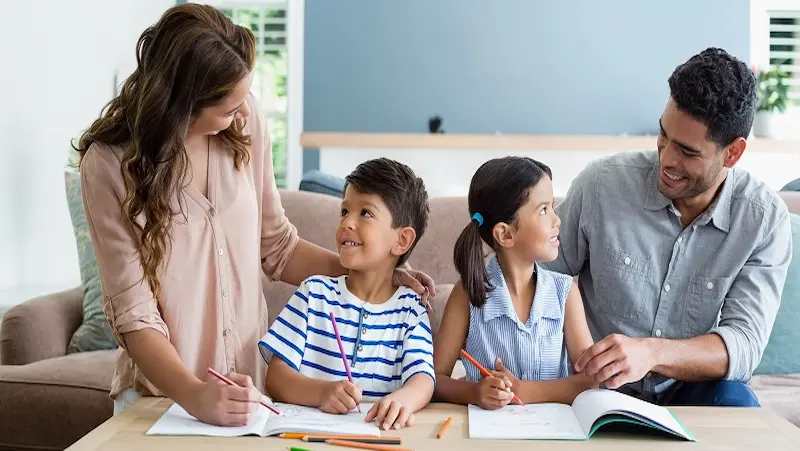Overcoming Multicultural Parenting Challenges
Embracing multicultural parenting involves addressing cultural expectations, language barriers, identity formation, tradition clashes, and blending parenting styles harmoniously. Embrace diverse perspectives and societal influences. Create a nurturing environment for language learning and cultural understanding. Celebrate unique traditions while finding common ground. Communicate openly and foster empathy within the family. Juggle priorities and set boundaries for work and family time. Instill a sense of pride in diverse backgrounds. Discover strategies to overcome challenges and build a supportive multicultural family.
Key Takeaways
- Establish open dialogue channels for understanding and communication.
- Engage in cultural understanding exercises to promote empathy.
- Utilize language learning techniques for deeper connections.
- Balance priorities to manage conflicting demands and schedules.
- Celebrate diversity through exploration and participation in cultural traditions.
Cultural Expectations

Managing cultural expectations as a multicultural parent can be a complex and enriching experience. Maneuvering generational differences and societal norms while raising children in a multicultural environment requires a delicate balance of cultural sensitivity and understanding. Each culture may have its own set of expectations regarding parenting styles, discipline, education, and familial roles. It’s vital to acknowledge and respect these differences to create a harmonious family dynamic.
In multicultural families, conflicts may arise due to varying societal norms that shape parenting practices. For instance, the importance placed on individualism versus collectivism can greatly influence how parents interact with their children. Understanding these cultural nuances is essential for fostering open communication and mutual respect within the family unit.
Moreover, family dynamics play a significant role in shaping cultural expectations. Extended family members often have strong opinions on parenting decisions, adding another layer of complexity for multicultural parents. Balancing the traditions and values of multiple cultures while raising children requires patience, empathy, and a willingness to adapt.
Embracing diversity and celebrating cultural differences can lead to a more enriched and inclusive family environment.
Language Barrier
Managing the language barrier as a multicultural parent can present unique challenges in effectively communicating with your children and accessing essential resources. Embracing language immersion at home can help create a bilingual upbringing for your children. Through daily interactions in different languages, you can foster their language skills and cultural understanding.
Additionally, engaging in cultural exchange activities, such as celebrating traditional holidays or preparing native dishes together, can further enhance their language proficiency and connection to their heritage.
Enrolling your children in language classes or programs can provide structured learning opportunities outside the home. These classes not only offer formal instruction but also create a sense of community with other bilingual families.
Encouraging your children to practice both languages regularly, whether through reading, watching movies, or conversing with relatives, can strengthen their language abilities and confidence. Remember, addressing the language barrier may be challenging, but with patience, consistency, and a supportive environment, you can help your children thrive in a multicultural and multilingual world.
Identity Formation
Guiding identity formation as a multicultural parent involves helping your children develop a strong sense of self that integrates their diverse cultural backgrounds. Encouraging your children to start on a self-discovery journey can be a powerful tool in shaping their identity. By fostering an environment that promotes cultural roots exploration, you provide them with the opportunity to understand and appreciate the various aspects of their heritage.
As your children navigate through their self-discovery journey, they’ll likely experience personal growth and develop a deeper understanding of themselves. Embracing multicultural perspectives can enrich their identity formation, allowing them to see the world through a more inclusive lens. Encouraging them to celebrate their cultural heritage while also being open to new experiences can help them build a strong and cohesive sense of self.
Tradition Clash
When raising children in a multicultural environment, clashes in cultural values can create tension within the family. Balancing the customs and traditions from different backgrounds can be challenging but is vital for fostering understanding and harmony in the household.
It’s important to navigate these conflicts with empathy, communication, and compromise to create a supportive and inclusive environment for your children.

Cultural Values Conflict
Managing cultural values conflict, also known as tradition clash, can be a complex and emotionally challenging aspect of multicultural parenting. When generational differences arise between you and your children due to varying cultural backgrounds, it can lead to conflicts. Finding a balance through cultural compromise is key.
To address cultural values conflict effectively, it’s important to seek value alignment within the family. Encouraging open communication and understanding each other’s perspectives can help bridge the gap.
Cultural integration, where aspects of both cultures are celebrated and respected, can create a harmonious environment at home.
Research suggests that acknowledging the differences while highlighting the shared values can foster mutual respect and appreciation. Embracing the richness of diverse cultural traditions can strengthen family bonds and promote a sense of unity.
Balancing Family Customs
Managing the delicate balance of family customs, also known as tradition clash, requires sensitivity and flexibility to honor each cultural background within your multicultural family. Family rituals play a significant role in shaping identity and strengthening bonds across generations.
However, when different cultural backgrounds come together, conflicts may arise due to generational differences in how these rituals are perceived and practiced. To navigate this challenge, it’s essential to foster open communication within your family. Encourage discussions where each family member can share their perspectives on the significance of specific customs and rituals.
By understanding the roots of these traditions and the emotions attached to them, you can find common ground and create new traditions that blend elements from both cultures. Flexibility is key in finding a harmonious balance. Be willing to adapt certain rituals to accommodate the diverse backgrounds within your family while still honoring the essence of each tradition.
Embracing this flexibility can lead to a deeper appreciation of each other’s cultural heritage and strengthen family bonds in the process.
Parenting Styles

Managing multicultural parenting can present unique challenges when it comes to blending different parenting styles within the family dynamic. Discipline techniques and educational approaches vary widely across cultures, impacting how parents raise their children. Understanding and respecting these differences is essential for harmonious family dynamics.
In multicultural families, maneuvering diverse social interactions can be complex. Each culture may have its own norms and expectations regarding behavior and communication, influencing parenting styles greatly. This diversity can sometimes lead to conflicts or misunderstandings within the family unit.
To overcome these challenges, it’s vital to have open and honest discussions about parenting styles. By sharing your beliefs and values regarding discipline, education, and social interactions, you can work towards finding common ground with your partner.
Additionally, seeking support from multicultural parenting resources or professionals can provide valuable insights and strategies for addressing these differences effectively.
Communication Strategies
When maneuvering the challenges of multicultural parenting, opening dialogue channels with your children is key to understanding their unique perspectives and experiences.
Engaging in cultural understanding exercises can help bridge any communication gaps and foster a stronger bond within your family.
Additionally, incorporating language learning techniques can facilitate effective communication and promote a deeper appreciation for each other’s backgrounds.
Open Dialogue Channels
Establishing clear and open channels of dialogue is essential in managing multicultural parenting challenges effectively. When it comes to fostering family bonding and promoting cultural exchange within a multicultural household, communication plays a pivotal role. Encouraging open dialogue channels allows for the expression of diverse perspectives, emotions, and experiences, creating a more inclusive and understanding environment for everyone involved.
To enhance communication within your multicultural family, prioritize active listening. Acknowledge and validate each family member’s thoughts and feelings, even if they differ from your own. This practice fosters mutual respect and strengthens the bond between family members.
Additionally, setting aside dedicated time for family discussions or activities can provide opportunities for cultural exchange and shared experiences.
Cultural Understanding Exercises
To foster cultural understanding within your multicultural family, engaging in communication exercises can be highly beneficial in promoting empathy and awareness among family members. Cultural immersion through cross-cultural activities allows individuals to experience firsthand the traditions and values of different cultures.
By participating in diversity appreciation and cultural sensitivity exercises, family members can develop a greater respect for each other’s backgrounds and perspectives.
One effective exercise is to have each family member share a significant cultural tradition or story from their heritage. This not only promotes understanding but also creates a sense of pride and belonging within the family unit.
Engaging in activities such as cooking traditional meals together, attending cultural events, or learning a new language can also deepen cultural awareness and strengthen family bonds.
Language Learning Techniques
Exploring efficient language learning techniques can greatly enhance communication within your multicultural family, fostering deeper understanding and connection among its members.
To improve language skills, consider using the immersion method, where you surround yourself with the language as much as possible. This could involve speaking the language at home, watching movies or TV shows in that language, and reading books or articles.
Additionally, incorporating flashcard practice into your routine can help with vocabulary retention and quick recall.
Interactive apps and language games are also valuable tools for language learning. These resources make learning fun and engaging, helping you and your family members stay motivated.
Whether it’s through language learning apps like Duolingo or playing language games together, these interactive tools can make the learning process more enjoyable.
Balancing Priorities

Maneuvering through the intricate web of competing demands can be a significant challenge for multicultural parents when it comes to balancing priorities. Time management becomes vital as conflicting schedules pull you in different directions. Juggling work commitments, cultural events, children’s activities, and personal time can feel overwhelming.
Research suggests that setting clear priorities and boundaries can help navigate these challenges.
To balance priorities effectively, start by creating a schedule that includes time for each aspect of your life. Allocate specific time blocks for work, family time, cultural celebrations, and self-care. Communicate with your partner or support system to coordinate schedules and share responsibilities.
Remember that it’s okay to say no to certain commitments to protect your time and energy for what matters most.
Additionally, consider the cultural significance of certain events or traditions and prioritize them accordingly. Embrace flexibility and be open to adjusting your schedule as needed.
Celebrating Diversity
Exploring the rich tapestry of diverse cultures and traditions can offer invaluable opportunities for growth and understanding in your multicultural parenting journey. Engaging in cultural celebrations and community events with your children not only fosters a sense of belonging and pride in their heritage but also promotes empathy and respect for other cultures. These experiences serve as powerful tools for diversity education, nurturing global awareness from a young age.
Participating in cultural celebrations provides a hands-on approach to learning about different traditions, languages, and customs, broadening your family’s worldview. Attending community events allows you to connect with a diverse range of individuals, creating a sense of inclusivity and unity within your community. By actively engaging in these activities, you’re instilling in your children the importance of embracing diversity and fostering a more inclusive society.
Celebrating diversity in your multicultural parenting journey not only enriches your family’s experiences but also contributes to raising culturally competent and globally aware individuals who are equipped to navigate an increasingly diverse world.
Building a Support System

Managing the complexities of multicultural parenting can be made more manageable by establishing a strong support system. Community involvement and peer support are crucial resources for parents handling the challenges of raising children in a multicultural environment. Engaging with cultural organizations, local community centers, or school groups can provide a sense of belonging and understanding.
Building connections with other parents facing similar experiences can offer a platform for sharing advice, venting frustrations, and seeking solidarity. Counseling resources and online forums are also essential components of a support system for multicultural parents. Professional counseling can provide personalized guidance and strategies for handling cultural conflicts within the family dynamic.
Online forums and support groups offer a convenient space for seeking advice, connecting with others, and accessing a wealth of shared experiences and knowledge. By tapping into these resources, you can gain valuable insights, find emotional support, and develop effective coping mechanisms to address the unique challenges of multicultural parenting.
Frequently Asked Questions
How Can I Address Cultural Appropriation Within My Multicultural Family?
To address cultural appropriation in your multicultural family, prioritize cultural sensitivity by openly discussing its impact. Use communication strategies to teach boundaries and foster respect for traditions. Encourage open dialogue and model acceptance and understanding.
What Are Some Ways to Navigate Differing Religious Beliefs With My Partner?
When managing differing religious beliefs with your partner, communication strategies are key. Listen actively, express your own beliefs openly, and find common ground. Compromise techniques such as respecting each other’s practices can foster understanding and harmony.
Is It Possible to Maintain a Sense of Belonging for My Children in Multiple Cultures?
Maintaining a sense of belonging for your children in multiple cultures is achievable. Balancing traditions and values while fostering their cultural identity and inclusion in diverse backgrounds can create a rich and fulfilling experience for them.
How Do I Handle Extended Family Members Who Are Resistant to Our Multicultural Lifestyle?
When dealing with resistant family members to your multicultural lifestyle, setting boundaries is essential. Educate them about your cultures and foster open communication. Family dynamics may shift, but with patience and understanding, you can navigate these challenges together.
Can You Provide Tips for Managing the Financial Aspects of Celebrating Multiple Cultural Holidays?
When managing the financial aspects of celebrating multiple cultural holidays, start by setting a budget plan to allocate funds for gift giving. Research cost-effective ways to incorporate cultural holiday traditions without straining your finances. Make thoughtful, budget-friendly choices.
Conclusion
To sum up, addressing multicultural parenting challenges requires patience, understanding, and open communication.
By recognizing cultural differences, managing language barriers, and striking a balance between traditions and modern parenting styles, you can establish a harmonious environment for your family.
Remember to embrace diversity, establish a solid support system, and prioritize the well-being of your children.
With dedication and perseverance, you can successfully manage the complexities of multicultural parenting and raise happy, confident, and culturally aware children.

Hey there! 👋 I’m a proud mom and passionate writer, sharing my parenting journey. 📝 Join me as I navigate the ups and downs of motherhood, offering tips, advice, and a sprinkle of humor along the way. 🌟







